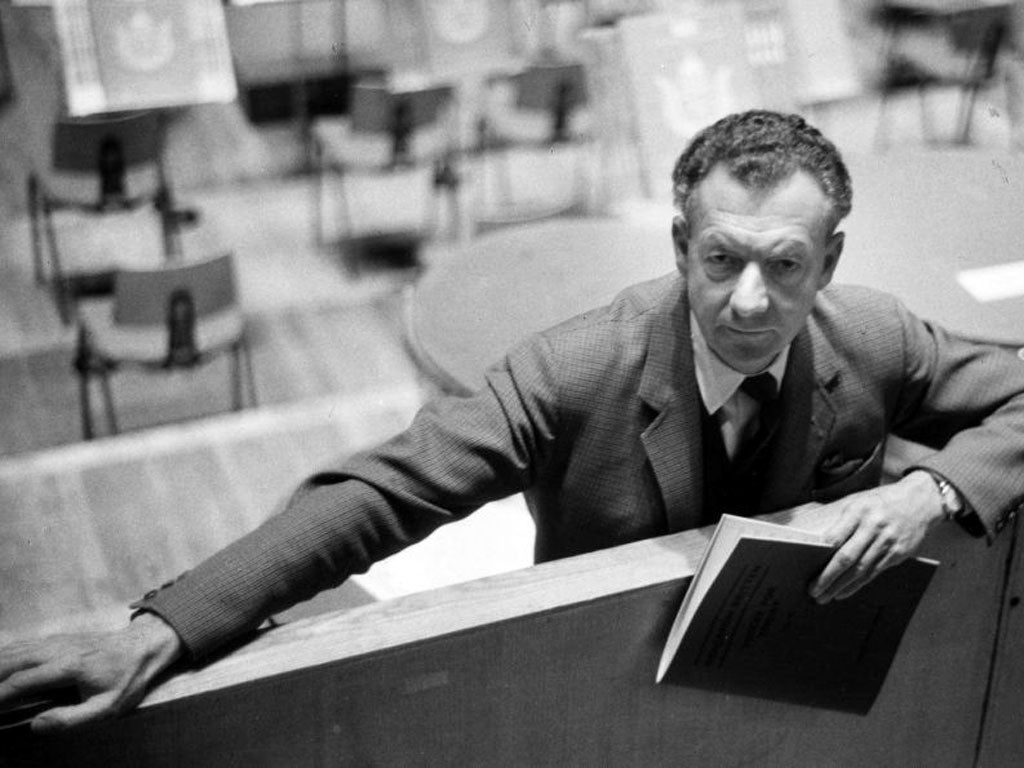Benjamin Britten and the Ministry of Defence censors

Your support helps us to tell the story
From reproductive rights to climate change to Big Tech, The Independent is on the ground when the story is developing. Whether it's investigating the financials of Elon Musk's pro-Trump PAC or producing our latest documentary, 'The A Word', which shines a light on the American women fighting for reproductive rights, we know how important it is to parse out the facts from the messaging.
At such a critical moment in US history, we need reporters on the ground. Your donation allows us to keep sending journalists to speak to both sides of the story.
The Independent is trusted by Americans across the entire political spectrum. And unlike many other quality news outlets, we choose not to lock Americans out of our reporting and analysis with paywalls. We believe quality journalism should be available to everyone, paid for by those who can afford it.
Your support makes all the difference.The Ministry of Defence (MoD) has refused to release footage for a major new documentary about Benjamin Britten because the composer was a pacifist and a “deserter”, an award-winning film-maker has claimed.
Britten’s centenary in November will be marked with a new film by Tony Palmer, whose Bafta-winning 1979 documentary A Time There Was... is regarded as the finest screen examination of the composer.
The new film, Nocturne, for Sky Arts, will examine some of his most memorable works.
A pacifist, Britten left for the United States, with his partner, the tenor Peter Pears, in 1939, following the example of WH Auden. Pears later recalled that their departure was greeted by a nation gearing up for war with cries of “Cads and cowards … Deserters even, if you will.”
The pair returned home in 1942 and registered as conscientious objectors. Britten offered to work for the Ministry of Information in lieu of military service, and was later granted full exemption from the armed forces.
Palmer sought to use footage of contemporary army training films to illustrate his film but claims that the MoD blocked his request because the composer was still considered a “deserter”.
Mr Palmer, 71, told The Independent: “I applied to the MoD for permission to use an army training film as illustration of the present-day UK attitude towards soldiering.
“Britten was a pacifist and a conscientious objector. He had a clear attitude towards war and all that entailed, and I wanted something to illustrate or contrast this with.
“I first applied to the MoD press office. In spite of 23 messages, no one ever replied.
“After three months I was put in touch with the ‘strategic marketing unit’. At first, the lady was helpful, but when she found out the project was to do with Benjamin Britten: a blank refusal. After all, I was told, he had been a pacifist and a conscientious objector.
“I telephoned to protest, only to be told that the MoD could not be seen dealing with ‘cowards’ and ‘those who had run away during the war’.

Watch Apple TV+ free for 7 days
New subscribers only. £8.99/mo. after free trial. Plan auto-renews until cancelled

Watch Apple TV+ free for 7 days
New subscribers only. £8.99/mo. after free trial. Plan auto-renews until cancelled
“The word ‘deserter’ was also used in conversation.” At this point, Mr Palmer sought alternative footage.
The MoD’s alleged refusal to release the images was raised in Parliament last week by Conservative MP Angie Bray. Defence minister Mark Francois said there were “no policies” which would prevent the release of film footage” because of Britten’s pacifism.
The MoD tonight confirmed it had requested information about how the footage would be used, but denied Mr Palmer’s version of events.
A spokesman said: “The MoD did not refuse to release footage to Mr Palmer nor did anyone suggest the subject matter of his film was inappropriate. As the copyright owner, the MoD has the right to request information about the context in which any material will be used.
“We had asked for more details about Mr Palmer’s programme and were awaiting further information.
“A wide variety of MoD footage can be made available for use by news outlets, film and documentary makers.”
Britten, who died in 1976, did not recant his pacifism.
He performed for the inmates of the liberated Belsen concentration camp at the end of the war in 1945 as piano accompanist to the violinist Yehudi Menuhin.
Nocturne, which examines the influence of Britten’s political beliefs on his music, will be screened in September.
Join our commenting forum
Join thought-provoking conversations, follow other Independent readers and see their replies
Comments